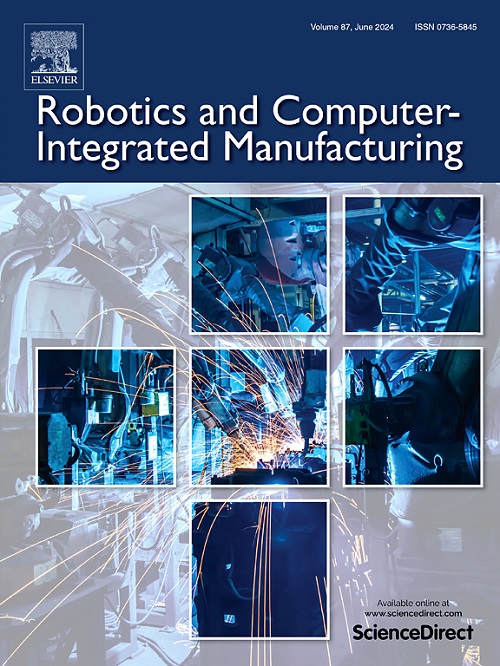具有联合维护、机器速度缩放和不确定加工时间的作业车间的可持续调度
IF 9.1
1区 计算机科学
Q1 COMPUTER SCIENCE, INTERDISCIPLINARY APPLICATIONS
引用次数: 0
摘要
本文通过在环境约束下集成预防性和纠正性维护、不确定加工时间和机器速度缩放来解决作业车间调度问题。在考虑机器可靠性、能耗和碳排放的情况下,建立了综合混合整数非线性规划(MINLP)模型来优化作业调度。该模型捕获了受机器速度变化影响的加工时间的不确定性,并使用威布尔分布集成了机器退化。全球碳足迹限制确保遵守环境目标。本研究考察了最小化完工时间、安排维护和实现可持续性目标之间的权衡。考虑到作业车间调度问题的NP-hard性质,采用双重方法进行有效求解。首先,放松和修复启发式通过迭代放松和固定变量子集来生成高质量的初始解,从而显著加快了优化过程。第二步采用分支定界算法,通过求解松弛子问题和细化整数变量,系统地探索解空间。数值实验验证了该模型,为复杂制造环境中的平衡维护策略、速度缩放和能源效率提供了见解。在最大允许碳足迹为550 kg CO2的情况下,当处理时间可变性设置为5%时,该模型的完工时间为18.98 h,总碳足迹为514.56 kg CO2。结果表明,预防性维护(PM)减少了维修时间,减轻了故障对完工时间的影响,并增强了机器速度调整,从而优化了能源消耗,以满足环境约束。敏感性分析表明,较高的故障率显著增加了维修时间和总完工时间。该模型在不同条件下动态调整机器速度以平衡环境目标和运行可靠性。本研究也为作业车间作业环境的永续调度模型提供重要的管理见解,强调维护、机器速度调整和有效处理加工时间变化的整合。本文章由计算机程序翻译,如有差异,请以英文原文为准。
Sustainable scheduling for job shops with joint maintenance, machine speed scaling, and uncertain processing times
This paper addresses the job shop scheduling problem by integrating preventive and corrective maintenance, uncertain processing times, and machine speed scaling under an environmental constraint. A comprehensive mixed-integer nonlinear programming (MINLP) model is formulated to optimize job scheduling, considering machine reliability, energy consumption, and carbon emissions. The model captures uncertainty in processing times, influenced by variations in machine speed, and integrates machine degradation using a Weibull distribution. A global carbon footprint constraint ensures compliance with environmental targets. This study examines the trade-offs between minimizing makespan, scheduling maintenance, and achieving sustainability objectives. Given the NP-hard nature of the job shop scheduling problem, a two-fold approach is applied for efficient solving. First, the Relax-and-Fix heuristic generates a high-quality initial solution by iteratively relaxing and fixing subsets of variables, thereby significantly accelerating the optimization process. The second step employs a branch-and-bound algorithm, which systematically explores the solution space by solving relaxed subproblems and refining integer variables. Numerical experiments validate the model, offering insights into balancing maintenance strategies, speed scaling, and energy efficiency in complex manufacturing environments. For a maximum permissible carbon footprint of 550 kg CO2, the model achieves a makespan of 18.98 h with a total carbon footprint of 514.56 kg CO2 when processing time variability is set at 5%. Results show that preventive maintenance (PM) reduces repair times, mitigates the impact of failures on makespan, and enhances machine speed adjustments, thereby optimizing energy consumption to meet environmental constraints. Sensitivity analysis reveals that higher failure rates significantly increase repair times and overall makespan. The model dynamically adjusts machine speeds to balance environmental targets with operational reliability under varying conditions. This study also derives key managerial insights for a sustainable scheduling model for job shop operating environments, emphasizing the integration of maintenance, machine speed adjustments, and the effective handling of processing time variability.
求助全文
通过发布文献求助,成功后即可免费获取论文全文。
去求助
来源期刊
CiteScore
24.10
自引率
13.50%
发文量
160
审稿时长
50 days
期刊介绍:
The journal, Robotics and Computer-Integrated Manufacturing, focuses on sharing research applications that contribute to the development of new or enhanced robotics, manufacturing technologies, and innovative manufacturing strategies that are relevant to industry. Papers that combine theory and experimental validation are preferred, while review papers on current robotics and manufacturing issues are also considered. However, papers on traditional machining processes, modeling and simulation, supply chain management, and resource optimization are generally not within the scope of the journal, as there are more appropriate journals for these topics. Similarly, papers that are overly theoretical or mathematical will be directed to other suitable journals. The journal welcomes original papers in areas such as industrial robotics, human-robot collaboration in manufacturing, cloud-based manufacturing, cyber-physical production systems, big data analytics in manufacturing, smart mechatronics, machine learning, adaptive and sustainable manufacturing, and other fields involving unique manufacturing technologies.

 求助内容:
求助内容: 应助结果提醒方式:
应助结果提醒方式:


